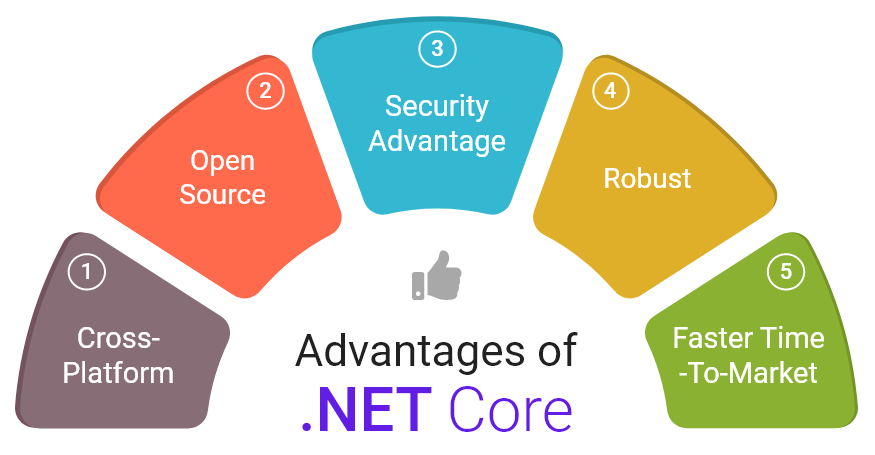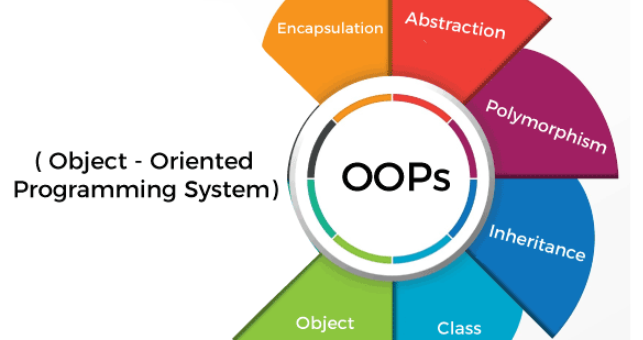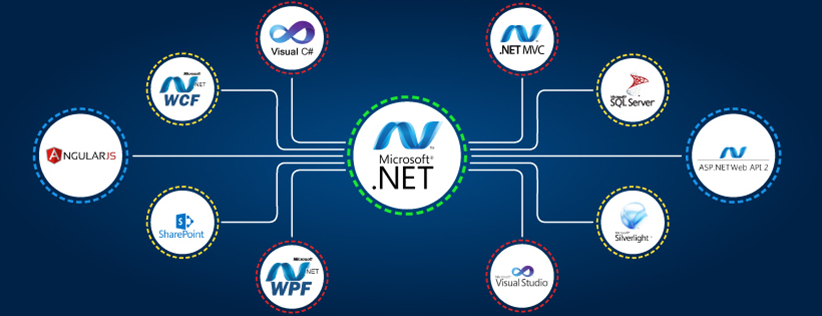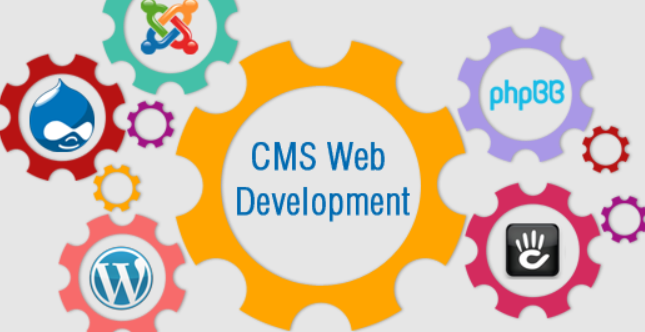.NET is a common framework for developing mission-critical, personalized, and scalable apps faster at less cost. Microsoft developed the .NET framework over two decades ago, and developers can use programming languages like C# and F#.
Companies use this entity framework with the help of development process teams to scale their operations quickly and lower their delivery time. However, to have the best .NET Framework apps, companies should involve personnel certified by Microsoft.
What Is The .NET Development Team?

.NET development teams use the .NET framework to develop mobile and/or web applications for their employers. However, the .NET development job description is a bit wide because many programming languages are involved, such as C#, F#, and VB.NET, not to mention the .NET stack, which includes ASP.NET, Silverlight, WCF, and WPF.
The daily job of .NET development teams is about developing and implementing suitable apps using specified frameworks, programming languages, and tools directly or indirectly linked to the collective term dotnet.
Developers and/or programmers in .NET devops teams mainly work in computer services, engineering, IT, and telecommunication companies. In addition, .NET development teams can also be found in R&D companies and the IT departments of many other companies.
What Is the Primary Responsibility of The .NET Team?

The primary responsibility of a .NET development team is as follows:
- Application optimization via testing, monitoring, and installing updates.
- Brainstorming to come up with high-quality solutions for clients using the .NET architecture alongside Microsoft’s technology stack.
- Net application development using the .NET framework and environment.
- Designing and developing user interfaces for .NET applications.
- Ensure code is error-free and that it follows best coding practices.
- Identify problems in apps and address them to ensure top-notch performance.
- Implement best practices to guarantee performance, safety, scalability, and quality in the .NET applications they develop.
- Incorporate data storage systems in existing or new .NET applications.
- Innovate and develop top-notch software net solutions using the .NET platform.
- Maintain and upgrade existing .NET applications.
- Modifying or rewriting existing code to boost performance and efficiency.
- Understand a client’s needs and transform these needs into functional desktop, web or mobile applications in line with business goals.
It’s worth noting that the primary responsibility of a .NET development dedicated team depends on the client’s requirements as well as other factors like geographical location and the experience of team members. Overall, .NET framework development teams are the custom software experts and engineers within Microsoft’s .NET development environment.
What Is The .NET Team’s Main Goal?

The main objective of the .NET team is to develop software apps with the help of the .NET framework, its programming languages, stacks, and other tools.
A .NET development team should be able to design and develop an entire app on their own. This means they should know the tools to build an app using the .NET framework successfully.
Not only does a .NET team design and develop feature-rich apps and software, but they also look after the performance, scalability, and security of these apps and software. Typically, they can use the .NET framework to develop mobile, web and desktop applications.
Some of The Advantages of .NET

Automated Code Checking
Code writing is by no means easy; mistakes are inevitable even if the developer writing the code is very experienced. If a developer makes a mistake, their project is at risk. To prevent such problems, the .NET core framework offers automation for code checking.
Complex UI Control
The .NET core framework has an advanced built-in user interface. The objective of the user interface is to enhance an app’s appeal and quality. The complex UI also allows 3rd party controls to boost the developed product. For instance, developers can add Telerik to simplify drag-and-drop processes. This allows developers to save on time and effort.
Cost Effective

When it comes to infrastructure, the .NET framework gives companies the freedom to choose a developer that can offer them cheaper SLAs (service-level agreements). In addition, businesses can opt to host their apps in the cloud.
Even if cost isn’t something, a net development company worries about, not being forced to spend on something that isn’t crucial still saves them money.
Cross-Platform Design
The .NET framework is regarded as cross-platform; this means it can run on platforms like macOS, Linux, and Windows OS. So, whether you’re wiring code in F#, C#, or Visual Basic, the code can be used in any compatible operating system.
This means that companies can access various platforms while remaining in the .NET ecosystem. This framework also comprises open-source code, meaning various programmers can contribute to its development.
Flexible Deployment
One of the most crucial benefits of the .NET framework is flexible deployment. What does this mean? It means that this framework can be installed as part of the application being developed by a programmer or separately. This flexible design allows developers to include all the tools they need. In addition, deployment with .NET is very easy.
Another benefit of the .NET framework is that programmers can install and run more than one .NET framework version on the same device. As a result, they can easily handle different projects and seamlessly finish them.
Object Oriented

.NET framework is based on OOP (object-oriented programming). OOP is basically a development model that comprises compartmentalizing an application into easily manageable smaller sections. Object-oriented programming breaks down data into data fields and designates the behavior of objects via a declaration of classes.
By simplifying and making code manageable, OOP can respond to recurring problems and simplify the testing process. It also eliminates unnecessary programming meaning developers and/or programmers code less. Not only that, the .NET framework makes it possible for developers to reuse code and certain components, which saves on time and money.
Security
Another essential benefit of the .NET framework is its ability to offer security to users such as business owners. The dotnet framework does this by allowing users to block problems within their code via .NET-mandated permissions. This helps prevent any malicious code from siphoning information and other detrimental activities.
Supportive Community

The .NET framework has a great community of supporters and, among them, programmers. It’s also popular among companies of all sizes. Being an open-source framework, .NET continues to attract new supporters and users. Novice developers can ask for help to improve their skills from more experienced developers within these communities.
Supports A Wide Variety of Apps
With the .NET framework, developers and programmers have the opportunity to develop apps in a variety of domains, such as AI (artificial intelligence), gaming, IoT, and productivity.
Microsoft recently announced a working agreement with SWIFT (Society for Worldwide Interbank Financial Telecommunications). This means the .NET framework will be at the center of fintech (financial technology).
This is happening because organizations have learned the massive potential of Big Data and ML (machine learning), which are supported in the .NET framework. Companies are investing more and more cash into such components to streamline their operations.
Visual Studio
Visual Studio is an IDE from Microsoft which is used to design, develop, debug and publish applications on various platforms, such as Android and iOS.
IDE (integrated development environment) makes app and software development services easier by offering the required components to develop and test apps.
Visual Studio has a marketplace that offers a wide variety of editor add-ons that allow for 3rd party connections, cloud-development project management, and collaboration of teams.
What Is A .NET Developer?

A .NET developer is an engineer that designs and develops applications with the help of the .NET framework and Microsoft’s tech stack. As a result, a .NET developer must have a good understanding of the .NET framework.
.NET developers are responsible for developing software solutions in line with their client’s needs. They are skilled enough to develop end-to-end software solutions.
Their main responsibilities include designing, creating, testing, installing, and maintaining applications. They use programming languages such as C#, F#, and VB.NET to develop apps. Which skills does a .NET developer need?
Experience in Frontend Technologies
A .NET developer can design and develop apps for virtually all devices and platforms, including mobile, PC, and web. To do this, .NET developers need to be experienced in frontend frameworks like Ajax, Bootstrap, CSS, HTML, JavaScript, etc.
Understanding different frontend technologies is beneficial because it means the developer can work on any project regardless of the requirements.
MCSD (Microsoft Certified Solutions Developer)
MCSD is a certification for .NET developers. Most businesses prefer that .NET developers have this certification prior to hiring them. Why? Because as the name suggests, it’s a certification from Microsoft which confirms a developer’s ability to design and develop applications using the .NET framework. So, when a developer has taken the MCSD examination and passed, they will be at the top of the list of any company looking to hire .NET developers.
Working with Databases
Regardless of the frontend or backend frameworks a developer chooses, they need to have a basic understanding of databases to help arrange data.
Knowledge of at least one database system, such as Microsoft SQL Server, Ms. Access, MySQL, and Oracle Database, is vital for managing app data.
What Is .NET Development Services?

Companies use .NET development services to expand their IT resources and reduce turnaround time. This is because .NET is open-source and can be used for any workload. It’s also very safe, unlike most other frameworks. The .NET development services available include:
.NET Mobile App Development
The NET framework allows you to design and built dynamic mobile apps with advanced functionality. Typically, applications built using the .NET framework incorporate various technologies providing sophistication in all levels.
.NET Web Application Development

.NET framework can be used to design dynamic web services. ASP.NET from the tech stack can be used to distinguish between various app layers, such as business logic, database, user experience and UI. This allows for a better separation of interests from a design perspective.
.NET can be used with traditional web forms such as Web API, which is used to develop basic HTTP services. It also offers a simple exchange of JSON (JavaScript Object Notation) text between service providers and clients.
ASP.NET Development Services
Businesses can hire developers to design, build, deploy, and maintain modern applications using the easy-to-use ASP.NET core web architecture.
Azure Development Services
Businesses can use experienced .NET developers experienced in Azure services such as SQL database and Stream Analytics to develop multiple cloud-native solutions.
CMS Website Development

Businesses can automate their CMS (content management systems) and create rich and interactive sites with the .NET framework for CMS net web development.
E-commerce Development
Companies can accommodate all their large-scale e-commerce business needs thanks to the high-performance, robustness, scalability, and security of the .NET framework.
Xamarin Development
Using Xamarin, .NET developers can transform the ideas of their clients into dynamic apps, whether for Android, iOS, or Windows OS.
Is .NET Developer a Backend Developer?

Yes, a .NET developer is a backend developer whose specialty is using Microsoft’s .NET framework to design, build and test mobile and web apps with programming languages such as C# (C-sharp), F# (F-sharp), and VB.NET. A .NET developer can be in charge of the following:
- Advising clients on suitable technical solutions
- Designing and creating new mobile and web applications
- Developing the design scheme of a database
- Evaluating a client’s needs
- Improving existing mobile and web applications
- Keeping up with technology trends
- Overseeing net software testing
How to Hire A .NET Development Team
Hiring .NET development teams is becoming harder each year. Why? Because .NET developers are in high demand, most of them have jobs. According to a Stack Overflow survey, only 6.5% of .NET developers are looking for jobs. The process of hiring a .NET dev team is as follows:
Develop a Clear Job Advertisement
Developing a job ad for most jobs is very easy. The hiring manager can come up with a detailed job description with cool words like ‘tech magician’ to bait potential employees.
However, hiring .NET development teams is different; weird vocabulary can shun developers. The job advertisement for a .NET developer should clearly state why the net development company needs a .NET developer. In addition, when the job advertisement is clear, it will prevent other professionals who lack the required skills and experience from applying.
Prequalify Candidates
Background checks require a lot of time that most people don’t have. Instead, businesses should use prequalification to help them find the professionals they need. By evaluating candidates based on the required years of experience and skills, companies will be able to select the best candidates and invite them for one-on-one interviews.
Interviews

Interviews for tech positions aren’t general; they require preparation. Businesses can determine how to go about the interview. For instance, they can ask theoretical questions, issue whiteboard tests, or even give applicants small net projects to evaluate their skill level.
This means that interviews shouldn’t be administered by persons without .NET development knowledge. When knowledgeable people do interviews for .NET developers, businesses can be able to filter good candidates from excellent ones.
Emphasis on Both Hard and Soft Skills
During interviews, .NET development interviewees should be queried on their hard skills. This means their knowledge of various .NET topics should be evaluated. For instance, a business can’t hire a .NET developer that doesn’t understand ASP.NET MVC.
However, it’s not only hard skills that matter; .NET developers should have soft skills that will help them deal with clients. Soft skills will come in handy when a developer is interacting with difficult clients; they won’t lose their temper.
Integrate New Team Members
Once candidates have passed their interviews and accepted the offers presented to them, they need to be on-boarded. Onboarding is a vital part of hiring any type of talent.
Onboarding comprises creating a suitable environment for new team members to integrate into the existing team smoothly. It also includes effectively communicating with them to prevent them from being frustrated and stressed while at work.
Different Ways to Hire .NET Developers

It takes time for a business to find .NET developers that match their expectations. The first step is determining whether they need an in-house or freelance .NET developer. Once a business knows what they want, they can use the following ways to hire .NET developers;
Events
One of the ways for businesses to find .NET talent is via .NET events. .NET developers without jobs or looking for newer challenges will likely attend such forums with the hope of networking with potential employers.
Freelancing Platforms
Businesses can also utilize freelance and outsourcing platforms like Toptal and Upwork to find .NET developers, albeit most of them only accept remote work.
GitHub

Perhaps the best way for businesses to hire .NET developers is by checking GitHub. This is a platform for net software development company, so businesses can likely find .NET developers that match their needs. On this platform, a hiring manager can understand the programming language and overall experience of the specialist they need.
Job Boards
Job Boards like AngelList specializing in development and programming have many .NET developers looking for work. While the best talents have most likely been hired, businesses can still find some pretty good .NET developers on job boards.
LinkedIn and Social Media
LinkedIn is a platform for businesses to network with professionals, so it’s one of the ways they can find .NET development talents. Businesses can also use social media platforms like Facebook and Twitter by posting open positions on their profile or timeline. To improve the reachability of the post, they can make it a paid ad.
Paid Ads

Companies with massive hiring budgets can use Google to hire .NET developers by publishing paid ads. Whenever a developer searches for .NET development opportunities near them, they will see the paid ad as their first option.
Referral Programs
Businesses can come up with referral programs to find the best .NET developers. This basically means rewarding their existing staff for referring qualified candidates. After all, an employed developer most likely knows another developer looking for work.
Stack Overflow
Stack Overflow is a website for professional developers and programmers. The reputation of a programmer in Stack Overflow provides more insight into their ability than a regular CV.
Finally
In conclusion, when it comes to hiring a .NET development team, ensure they have hard and soft skills. When hiring, you should know the personnel you’re looking for and where to look for them. This review should streamline your hiring business processes so that you can succeed in finding the right .NET development team members for your project.



